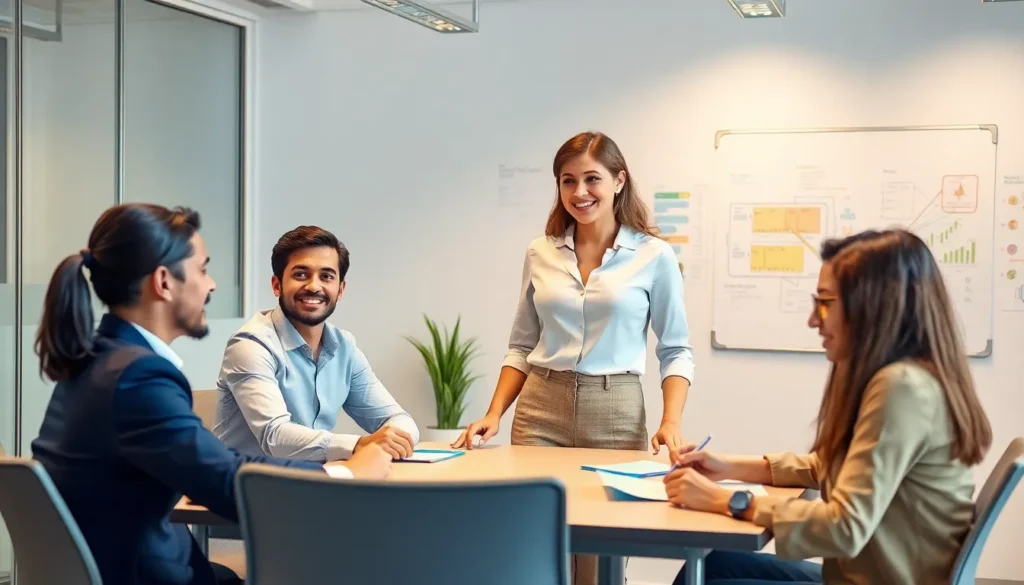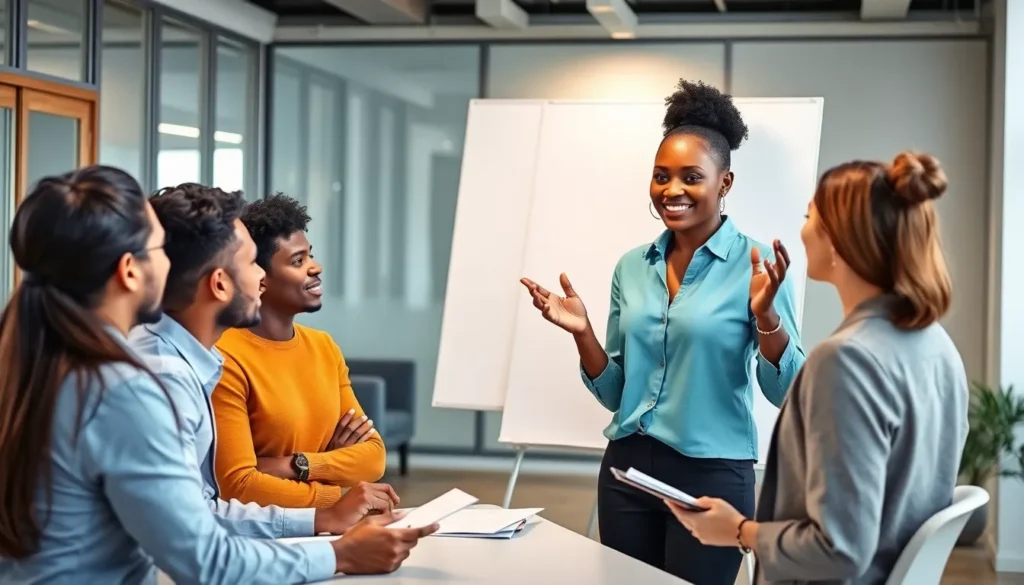In today’s fast-paced world, effective group leadership skills are more crucial than ever. Whether you’re leading a team of superheroes at work or just trying to wrangle your friends for a weekend outing, mastering these skills can turn chaos into harmony. Imagine transforming a room full of individuals into a well-oiled machine, all while keeping the vibe light and enjoyable.
Good leaders don’t just bark orders; they inspire, engage, and maybe even crack a joke or two. It’s about creating an environment where everyone feels valued and motivated. So, if you’re ready to elevate your leadership game and learn how to rally your troops without losing your sanity, you’re in the right place. Let’s dive into the essential skills that can make you the leader everyone wants to follow.
Group Leadership Skills
Effective group leadership skills create a conducive environment for collaboration and growth. Such skills encompass the ability to guide, motivate, and support team members in achieving common goals.
Definition of Group Leadership Skills
Group leadership skills refer to a collection of abilities that enable individuals to direct and influence groups effectively. These skills include communication, decision-making, conflict resolution, and emotional intelligence. Leaders proficient in these skills can create an inclusive atmosphere where every member can contribute and thrive.
Importance of Group Leadership Skills
Group leadership skills play a crucial role in fostering team cohesion and productivity. Effective leaders enhance team performance by inspiring trust and encouraging open dialogue. Positive leadership influences a supportive culture, resulting in higher job satisfaction and reduced turnover rates. Teams led by capable leaders often exhibit improved collaboration, increased creativity, and more innovative solutions.
Key Components of Effective Group Leadership

Effective group leadership relies on several key components essential for fostering a strong team dynamic. These components include communication skills, decision-making abilities, and conflict resolution techniques, which collectively influence a group’s success.
Communication Skills
Communication skills serve as the backbone of effective group leadership. A leader must convey information clearly and succinctly to ensure all team members understand objectives. Active listening enhances team interactions by making each member feel heard and valued. Providing constructive feedback fosters growth and maintains motivation within the group. Utilizing various communication channels, such as meetings or digital platforms, ensures everyone stays informed and engaged. Clarity in messaging can also prevent misunderstandings that could hinder progress.
Decision-Making Abilities
Decision-making abilities play a pivotal role in the leader’s effectiveness. Leaders should gather input from team members before making informed choices that reflect the group’s consensus. Analyzing pros and cons helps in assessing different options thoroughly. Prioritizing actions based on urgency and impact can direct team efforts efficiently. Effective leaders possess the ability to evaluate risks while encouraging team discussions on various approaches. Their confidence in decision-making inspires trust among members, leading to quick resolutions during challenging situations.
Conflict Resolution Techniques
Conflict resolution techniques are vital for maintaining harmony within a group. Leaders must identify sources of conflict quickly to address issues before they escalate. Open dialogue encourages team members to express their concerns in a safe environment. Establishing ground rules for discussions can help facilitate respectful exchanges. Implementing strategies like mediation allows leaders to guide parties toward mutually beneficial solutions. A focus on collaboration rather than competition creates an atmosphere where relationships strengthen, ultimately enhancing team cohesion.
Developing Group Leadership Skills
Enhancing group leadership skills involves targeted strategies. Effective methods include training sessions and mentorship opportunities that facilitate growth.
Training and Workshops
Focused training sessions significantly contribute to developing group leadership skills. Such workshops provide frameworks for effective communication and conflict resolution. Participants engage in practical exercises that simulate real-world challenges, fostering teamwork and problem-solving. Structured programs often cover decision-making techniques, which help leaders make informed choices that align with group objectives. Attendees leave equipped with tools tailor-made for improving leadership dynamics. Regularly attending these workshops cultivates ongoing learning and adaptation for leaders.
Mentorship and Coaching
Mentorship offers a personalized approach to skill enhancement. Effective mentors share insights from their experiences, which helps mentees navigate challenges with confidence. Regular coaching sessions allow for one-on-one discussions about specific leadership skills, encouraging accountability and growth. Mentors can provide constructive feedback, fostering a nurturing environment for leaders to thrive. Meaningful mentor-mentee relationships yield invaluable guidance, making it easier for emerging leaders to develop their unique leadership styles and self-awareness. This commitment to personal development strengthens group dynamics, improving overall team effectiveness.
Assessing Group Leadership Skills
Assessing group leadership skills plays a vital role in enhancing leadership effectiveness. Various methods exist to evaluate these skills objectively.
Self-Assessment Strategies
Self-assessment strategies empower individuals to reflect on their leadership abilities. Utilizing tools like journals encourages leaders to document their experiences and feelings about team interactions. Another effective method involves rating personal competencies on a scale, allowing individuals to visualize strengths and areas for improvement. Conducting introspective exercises can foster a deeper understanding of one’s emotional responses and communication styles in group settings. Setting specific goals based on self-reflection facilitates continuous growth and development in leadership skills.
360-Degree Feedback
360-degree feedback offers a comprehensive view of leadership performance from multiple perspectives. Gathering input from peers, subordinates, and supervisors presents a well-rounded assessment. This approach helps identify blind spots and areas needing enhancement. Anonymous surveys can encourage honest feedback, highlighting strengths and weaknesses. Ultimately, actionable insights gained from this feedback facilitate targeted development in communication, decision-making, and conflict resolution. Engaging with this process promotes accountability and fosters a culture of open dialogue, enhancing overall team dynamics.
Conclusion
Mastering group leadership skills is essential for anyone looking to create a thriving team environment. Effective leaders not only guide their teams but also inspire collaboration and innovation. By honing skills such as communication, decision-making, and conflict resolution, individuals can foster a culture where every member feels valued and empowered.
Investing in personal development through training and mentorship can significantly enhance these abilities. Regular self-assessment and seeking feedback further promote growth and accountability. Ultimately, strong group leadership leads to improved team cohesion and productivity, paving the way for success in any collaborative endeavor. Embracing these skills will not only benefit the leader but also create a positive ripple effect throughout the entire team.



